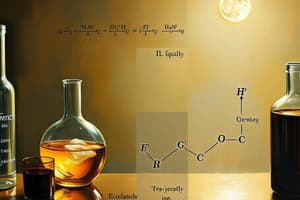Podcast
Questions and Answers
What is the main focus of the topic 'Redox Reactions'?
What is the main focus of the topic 'Redox Reactions'?
- Formation of ionic bonds between two species
- Transfer of protons between two species
- Transfer of electrons between two species (correct)
- Formation of covalent bonds between two species
Which topic covers the properties and effects of acids, bases, and salts?
Which topic covers the properties and effects of acids, bases, and salts?
- Classification of Elements
- Redox Reactions
- Carbon and Its Compounds
- Acids, Bases, and Salts (correct)
What does the section 'Carbon and Its Compounds' primarily emphasize?
What does the section 'Carbon and Its Compounds' primarily emphasize?
- Properties of noble gases
- Properties of metals and non-metals
- Versatility of carbon and its role in various compounds (correct)
- Formation of ionic compounds
What is essential for understanding the structure and properties of carbon compounds?
What is essential for understanding the structure and properties of carbon compounds?
What is the basis for the periodic classification of elements?
What is the basis for the periodic classification of elements?
Why is it essential for students to practice and revise these topics regularly?
Why is it essential for students to practice and revise these topics regularly?
What is the main focus of Chemistry Class 10?
What is the main focus of Chemistry Class 10?
What are students taught in Chemistry Class 10 about chemical equilibrium?
What are students taught in Chemistry Class 10 about chemical equilibrium?
What does Le Châtelier's Principle state?
What does Le Châtelier's Principle state?
What do students learn about in Chemistry Class 10 related to reaction order and reaction speed?
What do students learn about in Chemistry Class 10 related to reaction order and reaction speed?
In Chemistry Class 10, what do students explore regarding types of chemical reactions?
In Chemistry Class 10, what do students explore regarding types of chemical reactions?
What is the importance of learning about chemical equations in Chemistry Class 10?
What is the importance of learning about chemical equations in Chemistry Class 10?
Flashcards
Chemical Reactions
Chemical Reactions
Processes that involve the rearrangement of atoms and molecules, resulting in the formation of new substances.
Chemical Equations
Chemical Equations
Symbolic representations of chemical reactions using chemical formulas and coefficients to show the reactants, products, and their stoichiometry.
Balancing Chemical Equations
Balancing Chemical Equations
Ensuring that the number of atoms of each element on the reactant side equals the number on the product side to obey the Law of Conservation of Mass.
Combination Reaction
Combination Reaction
Signup and view all the flashcards
Decomposition Reaction
Decomposition Reaction
Signup and view all the flashcards
Reaction Order
Reaction Order
Signup and view all the flashcards
Reaction Rate
Reaction Rate
Signup and view all the flashcards
Chemical Equilibrium
Chemical Equilibrium
Signup and view all the flashcards
Le Chatelier's Principle
Le Chatelier's Principle
Signup and view all the flashcards
Redox Reactions
Redox Reactions
Signup and view all the flashcards
Acids
Acids
Signup and view all the flashcards
Bases
Bases
Signup and view all the flashcards
Study Notes
Chemistry Class 10: Chemical Reactions
Chemistry Class 10 is an essential part of the secondary education curriculum, focusing on the basic principles of chemical reactions and equations. This article will discuss the key subtopics covered in Chemistry Class 10, including:
-
Chemical Reactions and Equations: Students explore the concept of chemical reactions and equations, learning how to write and balance chemical equations. They also study the types of chemical reactions, such as combination and decomposition reactions.
-
Types of Chemical Reactions: This topic covers the various types of chemical reactions, including synthesis, decomposition, single displacement, double displacement, combustion, and single elimination reactions.
-
Reaction Order and Reaction Speed: Students learn about the reaction order and reaction speed, understanding how these factors affect the overall outcome of a chemical reaction.
-
Chemical Equilibrium: This concept introduces the idea of chemical equilibrium, where a reaction mixture reaches a stable state where the forward and reverse processes occur at the same rate.
-
Le Châtelier's Principle: Students explore Le Châtelier's principle, which states that when the concentration of a reactant or product is changed, the equilibrium system will shift in the direction that reduces the change.
-
Redox Reactions: This topic covers the basics of redox reactions, which involve the transfer of electrons between two species. Students learn how to identify redox reactions and the effects of these reactions on the environment.
-
Acids, Bases, and Salts: Students study the properties of acids, bases, and salts, including their effects on water and other substances.
-
Carbon and Its Compounds: This section focuses on the versatility of carbon and its role in various compounds, including saturated and unsaturated hydrocarbons, functional groups, and the modern periodic table.
-
Bonding in Carbon: Students learn about covalent bonding in carbon, which is essential for understanding the structure and properties of carbon compounds.
-
Classification of Elements: This topic introduces the periodic classification of elements based on their atomic number, electronic configuration, and valence electrons.
By studying these subtopics, students gain a solid foundation in chemical reactions and equations, preparing them for further advanced studies in chemistry. It is essential for students to practice and revise these topics regularly to ensure a thorough understanding of the subject matter.
Studying That Suits You
Use AI to generate personalized quizzes and flashcards to suit your learning preferences.
Description
Explore the fundamental principles of chemical reactions and equations covered in Chemistry Class 10, including types of reactions, reaction order, chemical equilibrium, Le Châtelier's principle, redox reactions, acids, bases, salts, carbon compounds, bonding in carbon, and periodic classification of elements.




